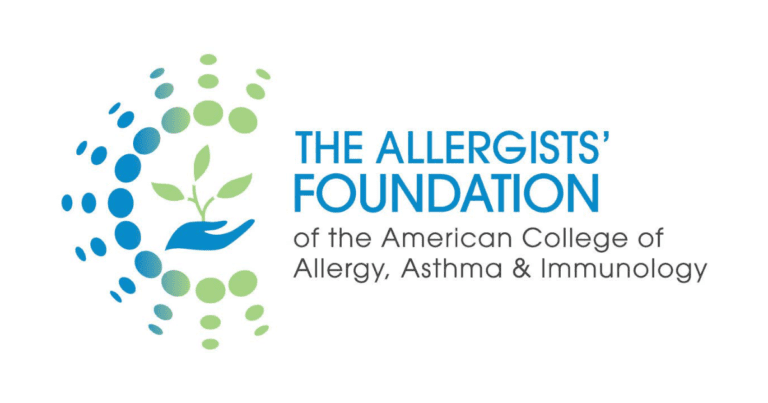The Allergists’ Foundation is seeking applications for projects that will focus on novel/innovative ideas to address challenges faced by community practicing allergists in the US and Canada.
Submission Deadlines:
Letter of Inquiry (LOI): February 17, 2025.
Full Proposals (by invitation only): May 2, 2025.
All requests for funding under the Allergists’ Foundation Community Grant program must be presented to the Foundation via a Letter of Inquiry (LOI). A selected number of applicants will then be invited to submit a full proposal. We strongly recommend that applicants carefully review our program areas of focus, criteria, and restrictions before submitting a Letter of Inquiry.
What We Fund
The Foundation will consider projects that fall in one of two categories:
- Planning/Exploratory Grants – The first category involves ideas that have not yet been explored and require some data gathering (e.g., a survey or needs assessment). Planning/Exploratory grant recipients will have 12 months to complete the project. Up to $10,000 may be requested.
- Implementation Grants – The second category involves projects where preliminary data were gathered and initial planning has been done already, including quality improvement projects with a well-defined gap and target. Implementation grant recipients will have up to 24 months to complete the project. Up to $25,000 may be requested.
Only projects that have clinical application, leading to improvements and positive change in the practice of allergy and asthma will be considered. Priority will be given to projects that have the potential of benefiting the specialty and to serve as a model to the field, rather than benefiting one practice. We will not fund basic science or translational research.
Areas of Focus
The Foundation will consider proposals that address challenges faced by community practicing allergists leading to improvements and positive change in the practice of allergy and the care for patients. Examples include, but are not limited to:
- Community outreach to address obesity and asthma specifically improving healthy eating habits and asthma outcomes.
- Community outreach to improve indoor air quality and asthma outcomes.
- Community-based solutions to address racial/ethnic disparities in the management of allergy and asthma.
- Community-based approaches to the diagnosis and management of marijuana allergy or allergy to other recreational drugs.
- Approaches to help practicing allergists determine the best strategy for anaphylaxis prevention for their patients (i.e., optimal Epinephrine autoinjector).
- Community-based food allergy management and prevention.
Program Criteria
The proposed program or project should:
- Focus on novel/innovative ideas (including the use of technology for telehealth projects) to address challenges faced by community practicing allergists.
- Include clinical application leading to improvements/positive change in the practice of allergy.
- Improve the future system of care for allergy and asthma patients.
- Cite/Reference reasonable evidence of replicability, where applicable.
- Result in the potential for national/large-scale applicability.
Note: Research projects must be limited to clinical research; we will not consider basic science or translational research. Research projects involving human subjects will require IRB approval. Quality Improvement projects may require institutional IRB exemption.
Eligibility
Applicants must meet the following eligibility criteria:
- Recognized as a physician member of the ACAAI (in good standing) residing in the US and Canada.
- Special consideration will be given to Fellow-in-Training (FIT) members from accredited Allergy/Immunology programs and members who are within their first 10 years of practice.
- FIT members will be required to specify how they plan to continue the project upon graduation. A second-year FIT may need to involve a first-year FIT to ensure project continuity. Project oversight by the program director or another faculty mentor (who must be a College member) will also be required for both exploratory and implementation grants; program directors will be asked to co-sign the terms of the award and serve as a co-investigator (or another faculty mentor) – assuming all the responsibilities associated with the application for and administration of the grant for the full duration of the project.
Proposal Review Criteria
- Significance – Does the project address an important problem/challenge faced by community allergists? Does it clearly meet the above stated program criteria? Does the proposal demonstrate capacity to implement effective, culturally competent programs; reach intended populations; and achieve clear, reasonable, and measurable goals and objectives to positively drive this field?
- Innovation – Does the project challenge and seek to shift current clinical practice paradigms by utilizing novel concepts, approaches, or interventions?
- Approach – Are the overall strategy, methodology, and evaluation well-reasoned and appropriate to accomplish the specified goals and objectives? Does the proposal address potential barriers and present alternative strategies to ensure the project’s success?
- Environment – Does the environment in which the project will be implemented contribute to its success? Are the resources that have or will be secured sufficient? Is there evidence of institutional/community support? Does the project adhere to nondiscriminatory policies within the program/workplace?
- Budget – Is the budget realistic and adequately justified?
- Project Team –Does the project team have appropriate expertise? Are individual members of the project team qualified to carry out their specified role in the project? Does the team include members in early stages (under 5 years) with opportunities to receive mentorship?
Application Process and Timeline
- Letter of Inquiry – due February 17, 2025
- Applicants meeting grant criteria invited to submit full proposal – by March 17, 2025
- Full proposals – due May 2, 2025
- Award notifications – by the end of June 2025
- Project start – by August 1, 2025 (projects involving human subjects will require IRB approval)
- Initial progress report – by February 1, 2026
- Final report – August 1, 2026 (planning projects); August 1, 2027 (implementation projects)
- Abstract submission (implementation projects) – July 2027
Restrictions: What We Don’t Fund
- Direct Salary support or FTE for investigators, administrative/clerical, or study staff. Technical assistance and/or data management/analysis support will be considered if appropriately justified
- Basic science or translational research
- Projects that are already fully funded through another source
- Scholarships
- Religious organizations for religious purposes or political organizations (for lobbying, etc.)
- Fundraising organizations/activities
- Indirect cost of more than 10% of the grant amount
Reporting, Publication and Acknowledgement of Support
Grant recipients will be required to submit a progress report (every 6 months of the project start date) and a final report (within 3 months of completion). NOTE: Grant recipients are also required to submit an abstract for presentation at the ACAAI Annual Scientific Meeting; also, Annals of Allergy, Asthma and Immunology will be given first right of refusal to publish the findings. Any additional publication or presentation (including a poster or oral abstract presentation) of the material based on or developed under this project must include an acknowledgement of the Allergists’ Foundation’s grant support.
NOTE: We strongly recommend consulting your institution’s pre-award office and/or grant administrator about the funding restrictions and grantee requirements (to ensure compliance) before submitting your proposal.
How to Apply
Submit a Letter of Inquiry
If you believe that your proposed project meets the scope of the program, eligibility and program criteria we encourage you to submit a Letter of Inquiry via the online form no later than February 17.
LOIs submitted after the deadline will not be considered.



